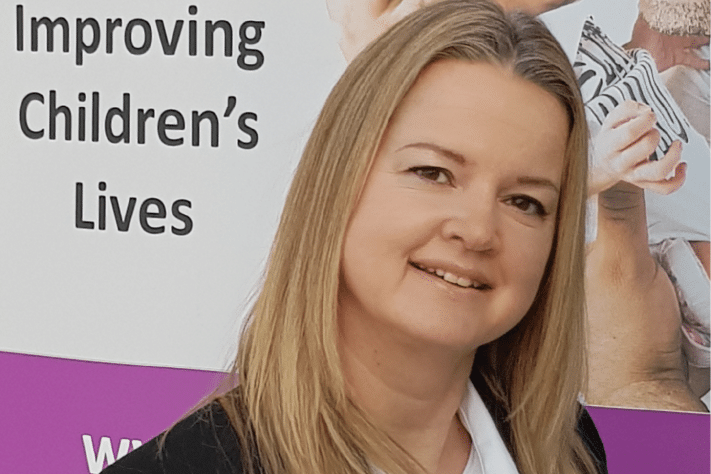25th March 2022
Georgina Mayes, Policy and Quality Lead at the Institute of Health Visiting, shares the latest updates for babies, children and young people in the Health and Care Bill.

Georgina Mayes, iHV Policy and Quality Lead
It’s not every day that you get to change the future direction of the of the NHS, but this is a time to celebrate! After nearly a year of collaboration, determination and hard work, babies, children and young people (CYP) are now on the face of the Health and Care Bill!
Background:
The iHV has been a member of the Health Policy Influencing Group (HPIG) which is hosted by the National Children’s Bureau (NCB) and the Council for Disabled Children (CDC). HPIG membership spans across 70 leading organisations who represent a strong, independent voluntary and community sector voice for babies and CYP. A recent priority for the HPIG was to address the gaps of the Integration and Innovation White Paper and the forthcoming Health and Care Bill.
What is the Health and Care Bill?
The purpose of the Health and Care Bill is to establish a legislative framework that supports collaboration rather than competition. The Bill also contains new powers for the Secretary of State over the health and care system, and targeted changes to public health, social care, quality and safety matters.
The Bill will introduce new integrated care systems (ICSs) which are partnerships that bring providers and commissioners of NHS services together with local authorities and other local partners to collectively plan health and care services to meet the needs of their local population.
The Bill introduces two-part statutory ICSs, comprising an integrated care board (ICB), responsible for NHS strategic planning and allocation decisions, and an integrated care partnership (ICP), responsible for bringing together a wider set of system partners to develop a plan to address the broader health, public health, and social care needs of the local population.
Babies, children and young people were not recognised on the face of the Bill
HPIG was collectively concerned that babies and CYP were not recognised as a unique population group who use a distinct health and care system, with its own children’s workforce and legislation. How could we expect a system that has been designed with the needs of adults in mind to work effectively for babies and CYP?
HPIG were concerned that:
- The benefits of integration had only been considered from an adult perspective.
- There had been little focus on how the proposed changes would affect existing duties on the NHS and other bodies as they relate to babies and CYP.
- Babies and CYP and their specific needs would become invisible within Integrated Care Systems.
What did the HPIG do and what was the outcome?
HPIG met regularly and collectively worked on writing amendments for the Health and Care Bill to ensure that babies and CYP were not forgotten about, gaining support from Peers (members of the House of Lords). On 3 March 2022, the amendments were debated in the House of Lords which resulted in babies and CYP (0- 25yrs) being included on the face of the Bill! The specific commitments in relation to Integrated Care Systems are:
- ICBs will be required by primary legislation to set out the steps it will take to address the needs of babies and CYP in the forward plan.
- NHS England will issue statutory guidance which will include a statement that each ICB must nominate an executive children’s lead, ensuring leadership for babies and CYP on every ICB.
- Bespoke guidance will contain provisions for the ICP strategy to consider child health outcomes and integration of children’s services. The ICP should consult with local children’s leadership and CYP/families themselves.
HPIG also requested for a data and information sharing amendment to be made to improve the sharing of information across all children sector organisations. The recent JTAI inspection of Solihull, following the tragic death of Arthur Labinjo-Hughes, highlighted how improvements are needed in this area. Unfortunately, this amendment was not successful. However, HPIG’s work has enabled another significant concession, that ICBs will now be required to report annually on how they are delivering their child safeguarding duties.
The Government has acknowledged serious and distinct challenges around the sharing of timely and relevant information about children between agencies, particularly vulnerable children, and has committed to delivering change in this area. The Government will now lay a report before Parliament within a year, setting out:
- A policy on a consistent identifier for children and its approach to improving information sharing more generally.
- How this can be achieved across health, children’s social care, police, and education settings.
- Cross-government actions that will be taken to implement the policy set out in the report.
Much more work is needed in this area and HPIG plans on supporting the implementation of this, alongside more detailed policy development. However, the Bill amendments represent a fantastic achievement, ensuring that there is a focus on babies and CYP in the new integrated system, and this is something which needs to be celebrated!
The iHV would like to express a heartfelt thank you to the NCB and CDC for leading this important work, coordinating the HPIG’s briefings and submissions, engaging with officials, and for providing excellent updates throughout each stage of the Bill passage. We are proud to be members of the HPIG and look forward to continuing our work as part of this group, providing a united voice for babies, children and young people now and in the future!






